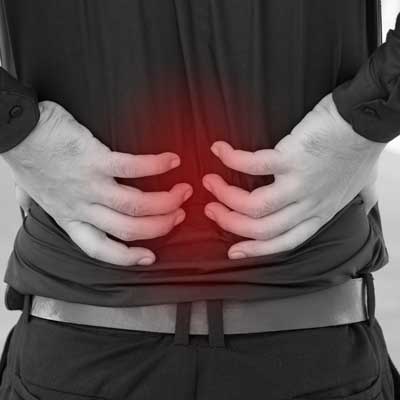Six Ways You May Herniate Your Disc

The spinal cord, spinal nerves and brain are the powerhouses of the body. It’s these very structures that work to keep our body functioning, so when it experiences a problem it can be harmful to our health. One of the most common spinal conditions that can affect the body is a herniated disc.
This condition is extremely common and can be very disruptive for someone dealing with a disc herniation. In this week’s blog, we are going to discuss what a disc herniation is, signs and symptoms, possible causes of them, and how to treat a herniated disc.
What is a disc? When we say herniated disc, we are referring to the spinal intervertebral discs that are between your vertebrae, which are the bones of your spine. Each disc is like a cushion between the bones and within this cushion, is a jelly center—similar to a jelly doughnut. Due to sudden or repetitive traumas, the disc can be injured and the gelatinous center can be pushed out putting pressure on the surrounding tissues including the spinal nerves. Think of when the jelly in the center of the doughnut comes out and makes a mess everywhere.
There are four stages of a disc herniation; it starts as a bulge, may progress to a protrusion or an extrusion or worse turn into a sequestered disc. Each stage has its own prognosis and treatment plans.
Symptoms of a herniated disc can be very broad and dependent on the person. Some of the most common symptoms of a herniated disc include: shooting arm or leg pain, numbness and tingling, and generalized weakness or fatigued. It is important to understand that these symptoms extend from the compression on the nerves in the spine. Therefore, most of the symptoms that you will experience will be categorized by neurological symptoms.
A herniated disc is diagnosed from a MRI. It is common to start with a X-ray to rule out any other causes. A MRI is the best test for this because it allows the provider to physically visualize the herniation which tells them exactly where the herniation is located. This helps the provider to tailor a treatment plan specific to the patient.
Below are six ways you may herniate your disc:
#1. Shaving
Anything that requires bending over and twisting slightly can be the cause of a herniation. Shaving is one of those everyday tasks that can push someone over the edge and cause a herniated disc. The unfortunate thing is that you probably won’t know that you are close to developing a herniated disc until it occurs, so avoiding this may be difficult.
#2. Tying your shoes
Much like what was stated before, anything that requires bending over can be a risk factor for a herniated disc. Tying your shoes is another everyday task that can lead to the development of a herniation. Much like the previous cause, this is too difficult to avoid since it is such a common everyday task.
#3. Exercising wrong
Lifting heavy weight alone is a risk factor for a herniated disc, so when you throw poor form into the mix you can have a recipe for disaster. Exercising wrong is one of the most avoidable ways to prevent an injury, specifically a herniated disc. It is not uncommon to see athletes who work out everyday, develop these types of injuries. Whether they are lifting with improper form and lifting too heavy of weight for what their body can handle, this injury is common to occur.
#4. Shopping
This one is surprising to people. Shopping can be another task that involves heavy lifting. Whether you are trying to lift a case of water in the food store or carrying a ton of heavy shopping bags; shopping is a strength inducing task. As we just mentioned, lifting heavy and lifting heavy improperly can be the direct cause of a herniated disc. It does not even require you to do something extravagant, this injury can occur with common everyday tasks.
#5. Poor Posture
Poor posture is one of the most common root causes of a herniated disc. This is because your poor posture can be the initial cause of the weakening or misplacement of the disc, but then another cause can come along and result in the complete herniation. This is one of the reasons why proper posture is so important to have and maintain.
#6. Sneezing
This another one is surprising to most people. How can sneezing cause you to herniate a disc? Well if your discs are already weakened or slightly misplaced, the pressure that comes with a sneeze can be that final push to herniation.
Now that we know more about herniated discs, how do we treat it? Now, this really all depends on the severity of the herniation. Some herniations require surgery, while others can be managed right in a chiropractic office. Some do well with Non-Surgical Spinal Decompression which is a motorized traction that works wonders for disc herniations and other conditions. Regardless of the method of treatment, the goal with treatment is to decompress the herniation; whether that is done through surgery or not.
With all this said, if you or someone you know is suffering from a herniated disc, don’t delay making an appointment so the proper steps to a diagnosis and treatment can be made.
